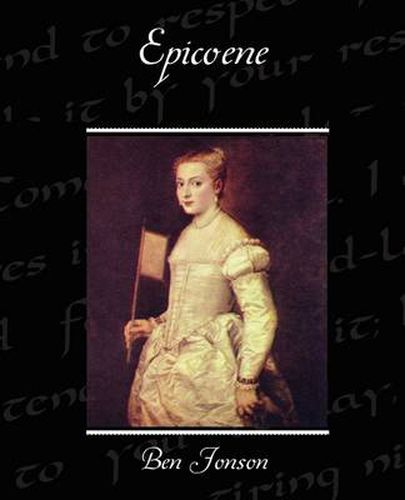Readings Newsletter
Become a Readings Member to make your shopping experience even easier.
Sign in or sign up for free!
You’re not far away from qualifying for FREE standard shipping within Australia
You’ve qualified for FREE standard shipping within Australia
The cart is loading…






This title is printed to order. This book may have been self-published. If so, we cannot guarantee the quality of the content. In the main most books will have gone through the editing process however some may not. We therefore suggest that you be aware of this before ordering this book. If in doubt check either the author or publisher’s details as we are unable to accept any returns unless they are faulty. Please contact us if you have any questions.
Ben Jonson was an English Renaissance dramatist, poet and actor. He is known for his satirical plays such as Volpone, The Alchemist, and Bartholomew Fair. Jonson was a great reader and lover of controversy. He had an unparalleled breadth of influence on Jacobean and Caroline playwrights and poets. In 1616 he received an annual pension of 100 marks making him the first Poet Laureate of England. Epicoene, or The Silent Woman is a Renaissance comedy. It was originally performed by a group of boy players. The plot summary from Wikipedia reads, Morose, a wealthy old man with an obsessive hatred of noise, has made plans to disinherit his nephew Dauphine by marrying. His bride Epicoene is, he thinks, an exceptionally quiet woman; he does not know that Dauphine has arranged the whole match for purposes of his own The couple are married despite the well-meaning interference of Dauphine’s friend True-wit. Morose soon regrets his wedding day, as his house is invaded by a charivari that comprises Dauphine, True-wit, and Clerimont; a bear warden named Otter and his wife; two stupid knights, La Foole and Daw; and an assortment of collegiates, vain and scheming women with intellectual pretensions. Worst for Morose, Epicoene quickly reveals herself as a loud, nagging mate Desperate for a divorce, Morose consults two lawyers (actually Dauphine’s men in disguise), but they can find no grounds for ending the match. Finally, Dauphine promises to reveal grounds to end the marriage (in exchange, Morose must come to financial terms with him). The agreement made, Dauphine strips the female costume from Epicoene, revealing that the wife is, in fact, a boy. Morose is dismissed harshly, and the other ludicrous characters are discomfited by this revelation; Daw and Foole, for instance, had claimed to have slept with Epicoene.
$9.00 standard shipping within Australia
FREE standard shipping within Australia for orders over $100.00
Express & International shipping calculated at checkout
This title is printed to order. This book may have been self-published. If so, we cannot guarantee the quality of the content. In the main most books will have gone through the editing process however some may not. We therefore suggest that you be aware of this before ordering this book. If in doubt check either the author or publisher’s details as we are unable to accept any returns unless they are faulty. Please contact us if you have any questions.
Ben Jonson was an English Renaissance dramatist, poet and actor. He is known for his satirical plays such as Volpone, The Alchemist, and Bartholomew Fair. Jonson was a great reader and lover of controversy. He had an unparalleled breadth of influence on Jacobean and Caroline playwrights and poets. In 1616 he received an annual pension of 100 marks making him the first Poet Laureate of England. Epicoene, or The Silent Woman is a Renaissance comedy. It was originally performed by a group of boy players. The plot summary from Wikipedia reads, Morose, a wealthy old man with an obsessive hatred of noise, has made plans to disinherit his nephew Dauphine by marrying. His bride Epicoene is, he thinks, an exceptionally quiet woman; he does not know that Dauphine has arranged the whole match for purposes of his own The couple are married despite the well-meaning interference of Dauphine’s friend True-wit. Morose soon regrets his wedding day, as his house is invaded by a charivari that comprises Dauphine, True-wit, and Clerimont; a bear warden named Otter and his wife; two stupid knights, La Foole and Daw; and an assortment of collegiates, vain and scheming women with intellectual pretensions. Worst for Morose, Epicoene quickly reveals herself as a loud, nagging mate Desperate for a divorce, Morose consults two lawyers (actually Dauphine’s men in disguise), but they can find no grounds for ending the match. Finally, Dauphine promises to reveal grounds to end the marriage (in exchange, Morose must come to financial terms with him). The agreement made, Dauphine strips the female costume from Epicoene, revealing that the wife is, in fact, a boy. Morose is dismissed harshly, and the other ludicrous characters are discomfited by this revelation; Daw and Foole, for instance, had claimed to have slept with Epicoene.